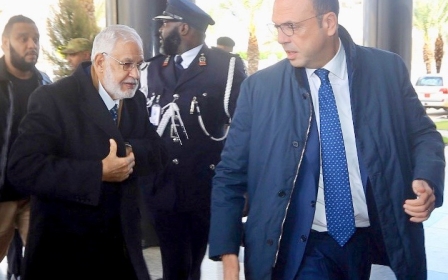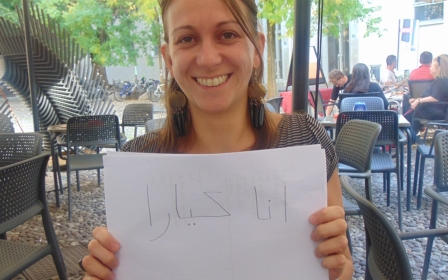Elections, migrants, and a fascist renaissance in Italy

Earlier this year, Italian politician Attilio Fontana warned radio listeners that the "white race" was under existential threat thanks to the usual suspects: immigrants.
The Italian newspaper Corriere della Sera quotes his analysis as follows: "We must decide whether our ethnicity, our white race, our society should continue to exist or should be erased."
Fontana is a member of the political party known until recently as the Northern League (Lega Nord), before the "Northern" qualifier was dropped to accommodate right-wing maniacs in central and southern Italy.
As Italy bleats about migrant invasions that endanger race, society and culture and threaten to disappear 'centuries of history', the history of Italy's own endangerment of all of these things is conveniently erased
The League, commanded by European Parliament deputy Matteo Salvini, is part of what is described as a centre-right coalition, although it is anyone's guess how the "centre" fits in. Led by the Forza Italia party of Italy's recurring affliction, Silvio Berlusconi, the coalition is predicting favourable returns in Italy's general election on 4 March.
According to Salvini, who is also quoted in the Corriere della Sera article, the problem with immigrants is not so much "skin colour" as the "Islamic presence in the country," which has resulted in a situation in which "we are under attack; at risk are our culture, society, traditions, and way of life ... Centuries of history are at risk of disappearing if Islamisation prevails."
Salvini credits the late Italian journalist Oriana Fallaci with having prophesied the attack, which indeed she did, in numerous unhinged rants on subjects ranging from alleged Muslim plots to blow up Saint Peter's cupola in Rome to equally nefarious Muslim schemes to replace European mini-skirts with chadors and cognac with camel's milk.
(Nor did Fallaci confine her ominous forecasts to the European continent. She also lambasted US universities for permitting persons by the name of Mustafa and Muhammed to study biology and chemistry despite the threat of germ warfare.)
In 2006, Fallaci threatened to explode a mosque and Islamic centre slated for construction in Tuscany, no doubt a rather ironic solution to the problem of terrorism.
Salvini, meanwhile, may have a particular problem with Muslims, but that doesn't mean that all other "others" are off the hook. The League has pledged mass deportations of asylum seekers to Africa, while Berlusconi has put the number of prospective deportees at 600,000.
Despite a long history of misdeeds - from tax fraud to mafia ties to infamous "bunga bunga" parties - billionaire Berlusconi is back in the game yet again, although he is barred until 2019 from holding office.
The New York Times observes that Berlusconi, a three-time Italian prime minister and head of a "sprawling media empire," has now "cleverly nurtured a constituency of aging animal lovers - and potential voters - by frequently appearing on a show on one of his networks in which he pets his fluffy white dogs and bottle-feeds lambs".
Of course, Berlusconi also utilises his television stations for activities other than lamb-nursing. In February remarks to Canale 5, the 81-year-old sounded off on the topic of immigration, declaring that "all these migrants live off trickery and crime" - a pretty bold statement coming from someone who has himself been convicted of numerous crimes and whose domination of the Italian media landscape seems as good a form of trickery as any.
The anti-immigrant rhetoric is nothing new; Berlusconi has long been a role model in the field of national prejudice.
In 2009, Corriere della Sera quoted him on the inadvisability of a "multicoloured and multiethnic society" - and how it was "unacceptable that sometimes in certain parts of Milan there is such a presence of non-Italians that instead of thinking you are in an Italian or European city, you think you are in an African city".
Colonial crimes
This might be a good time to point out that, in the not-so-distant past, Italians were in fact present in plenty of African cities, where they were engaged in brutal campaigns of occupation and colonisation that helped set the stage for future migration patterns.
In The Addis Ababa Massacre: Italy’s National Shame, for example, author Ian Campbell documents the Italian military occupation of Ethiopia (1936-41), which was "underpinned by a policy of terror". According to Campbell's estimates, a three-day massacre in February 1937 by Italian militants and civilians wiped out 19-20 percent of the Ethiopian population of Addis Ababa.
A 2017 blog post on the website of the prominent Brookings Institution, meanwhile, recalls some of the highlights of Italian colonialism in Libya, such as the forcible quelling of resistance via the internment of some 100,000 civilians from semi-nomadic tribes "in a dozen concentration camps".
The upshot: the Italians eventually "won", but in devastating the territory ensured that "the seeds of further discord had been sown".
Now, as Italy bleats about migrant invasions that endanger race, society and culture and threaten to disappear "centuries of history," the history of Italy's own endangerment of all of these things is conveniently erased from the discourse.
As for contemporary Italian relations with Libya - a major jumping-off point for the often-deadly refugee voyage to Europe - Italy has come under fire from human rights organisations for collaborating with Libyan entities known to torture and otherwise abuse migrants.
Meanwhile, according to hallucinatory Italian right-wing propaganda, those migrants who do make it to Italy find a life of luxury hotels and other goodies. During my regular trips to southern Italy, I've spoken with plenty of citizens concerned that their hard-earned money is being squandered on accommodation, cellular phones, and whatever else the lazy and opportunistic refugee heart might desire.
Scapegoating migrants
Never mind all of the hard-earned Italian money that goes to fund corruption, the scapegoating of immigrants for financial and social ills is a tried-and-true tactic for distracting the public from government negligence and thievery.
In reality, of course, migrant life in Italy is generally devoid of luxury - not to mention dignity, rights, and all that good stuff. When I travelled by train from Taranto to Bari this past summer, one conductor checked all of the tickets in my car, while another rechecked only the tickets of the two black passengers.
Nor have migrants been spared physical violence. In early February, a former League candidate for municipal office and fan of Salvini opened fire in central Italy, wounding six African immigrants.
Also in February, as the New York Times reported, the Brothers of Italy - an ultra-right component of the Berlusconi-led coalition - were up in arms over a decision by the Egyptian Museum in the north Italian city of Turin to offer a discount to Arabic speakers.
The Brothers of Italy, the Times notes, is "a direct successor of the country's long-disbanded Fascist Party, which has continued to inspire political movements in Italy even though it is illegal".
The museum's traitorous decision was, according to the party, proof of "racism in Italy – against Italians". (The director of the museum pointed out that the group had not felt compelled to protest against the free admission for students on Thursdays.)
Appropriately, the Brothers' head of communications is quoted as describing the Arabic-speaker discount as a "symptom of the illness of the West". While this is obviously not what he meant, it seems the West is getting sicker by the minute.
As Italy votes on 4 March, racism and xenophobia stand a good chance of winning the day, if they haven't already.
- Belen Fernandez is the author of The Imperial Messenger: Thomas Friedman at Work, published by Verso. She is a contributing editor at Jacobin magazine.
The views expressed in this article belong to the author and do not necessarily reflect the editorial policy of Middle East Eye.
Photo: Leader of far-right party the League, Matteo Salvini (R), embraces the head of the centre-right Forza Italia (Go Italy), Silvio Berlusconi, during a joint press conference with leader of far-right party Brothers of Italy (unseen) at the Tempio di Adriano in Rome on 1 March (AFP).
Middle East Eye propose une couverture et une analyse indépendantes et incomparables du Moyen-Orient, de l’Afrique du Nord et d’autres régions du monde. Pour en savoir plus sur la reprise de ce contenu et les frais qui s’appliquent, veuillez remplir ce formulaire [en anglais]. Pour en savoir plus sur MEE, cliquez ici [en anglais].





